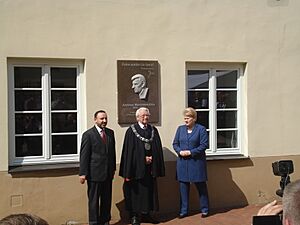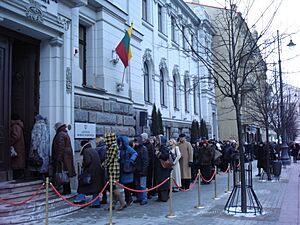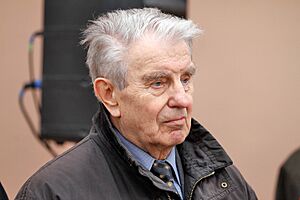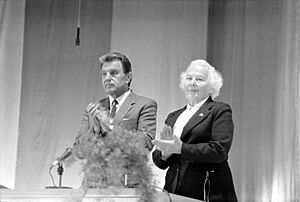Justinas Marcinkevičius facts for kids
Justinas Marcinkevičius (born March 10, 1930 – died February 16, 2011) was a very important Lithuanian poet and writer of plays. He is known for his beautiful words and stories about his home country.
Contents
Life and Career
Justinas Marcinkevičius was born in 1930 in a small village called Važatkiemis, in the Prienai area. He went to Vilnius University and finished his studies in 1954. He learned about the Lithuanian language and literature.
He worked for many years as a leader in the Union of Lithuanian Writers. Marcinkevičius was also a very important person in a group called Sąjūdis. This group helped Lithuania become independent from the Soviet Union. He passed away in Vilnius.
Writing Style and Themes


Justinas Marcinkevičius grew up after a big war. In his poems, he often wrote about his childhood in the Lithuanian countryside. He described first love and how people connect with nature. His writing mixed simple, down-to-earth ideas with bigger thoughts about life. He also continued the tradition of Lithuanian poetry that praises the land.
Marcinkevičius wanted to understand what it meant to be Lithuanian and show it in a new way through his art. In his poems, he tried to understand what was happening inside people and in society. His honest and strong feelings often touched his readers.
He lived and wrote during a difficult time when Lithuania was part of the Soviet Union. He bravely defended the culture and identity of his nation. He brought back the idea of focusing on human values in his writing. He also continued the tradition of romantic and lyric poetry, which values beauty in literature. This was different from the "socialist realism" style, which was more about heroes and government messages. Marcinkevičius wrote his poems in a romantic and modern way.
Awards and Recognitions
Justinas Marcinkevičius received many important awards for his work:
- Lithuanian National Prize
- Herder Prize 1998
- Baltic Assembly Prize for Literature, the Arts and Science (2001)
- National Advancement Prize in Culture (2008)
Important Works
After his first book, I Plead for a Word, came out in 1955, Marcinkevičius published many more books. He wrote fourteen collections of poems, three historical plays, two collections of essays, a short novel, and translated many works into Lithuanian.
Poetry and Collections
- Liepsnojantis krūmas (The Burning Bush; 1968)
- Gyvenimo švelnus prisiglaudimas (The Gentle Cuddle of Life; 1978)
- A set of three rhymed historical plays:
- Mindaugas (1968)
- Mažvydas (1977)
- Katedra (The Cathedral; 1971)
Novels
- Dienoraštis be datų (A Diary Without Dates; 1981)
- Tekančios upės vienybė (Unity of a Flowing River; 1994)
He also translated works by famous writers like Adam Mickiewicz, Alexandr Pushkin, Sergei Yesenin, Mikhail Lermontov, and the Finnish story Kalevala into Lithuanian.
 | Delilah Pierce |
 | Gordon Parks |
 | Augusta Savage |
 | Charles Ethan Porter |



